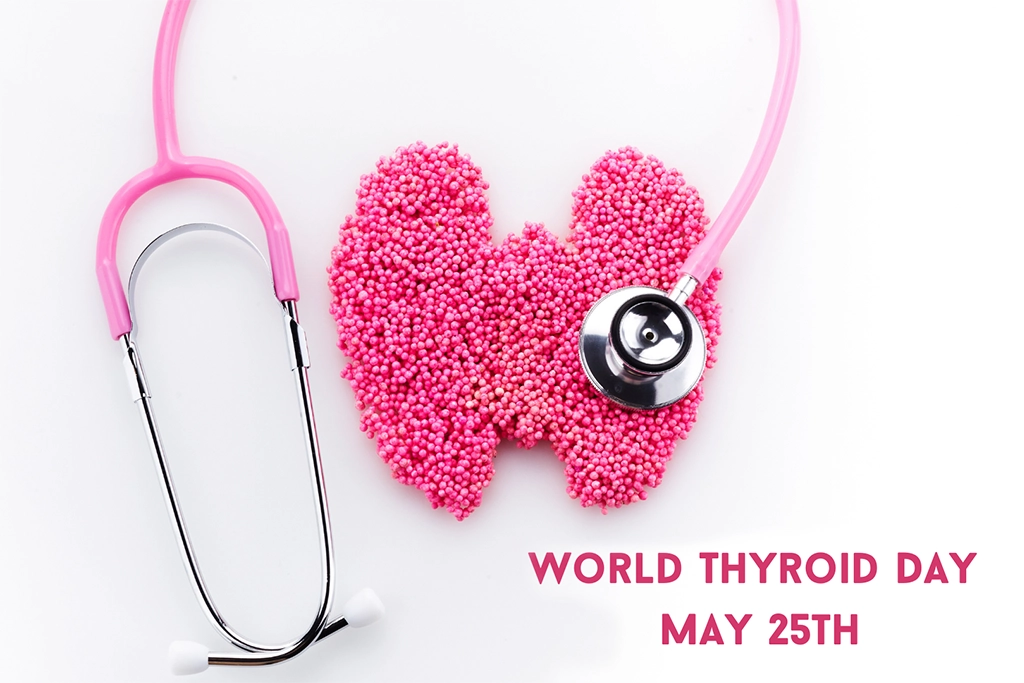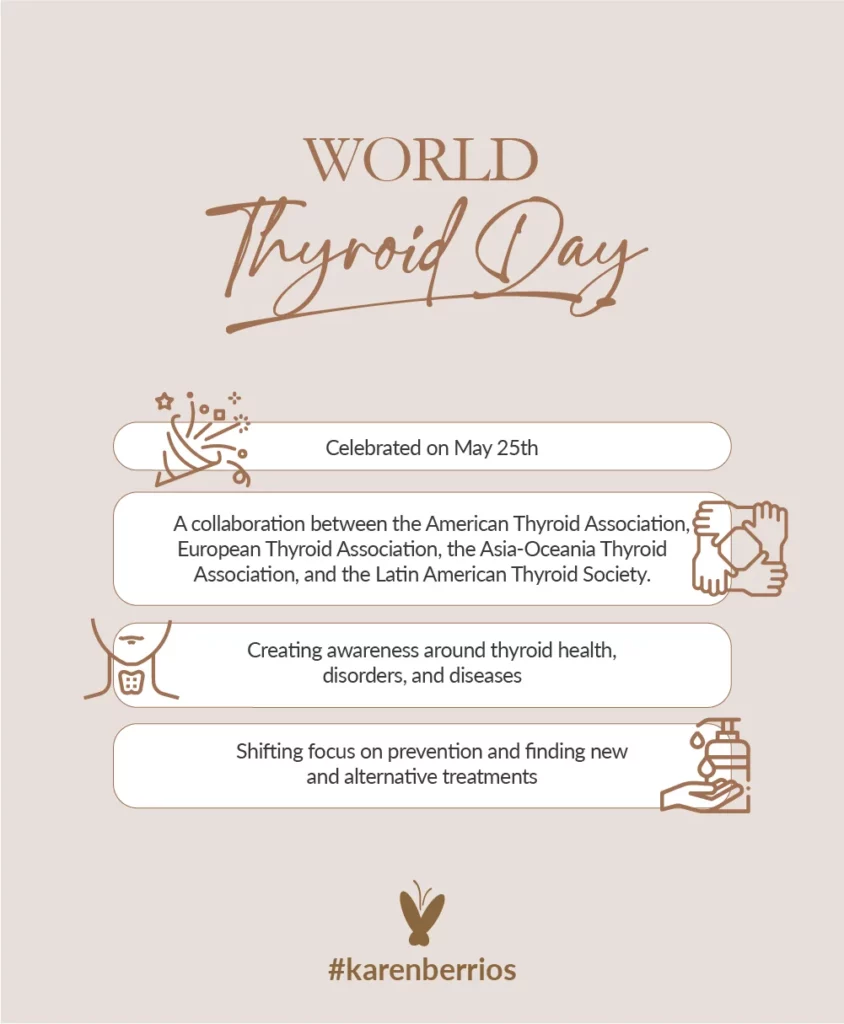

World Thyroid Day
Every year, on May 25th, we celebrate World Thyroid Day and mark the importance of this amazing gland that’s governing our entire body. It’s not just a day to reflect and post Instagram photos, it’s a day to become more present, more mindful, and more observant of the signs your thyroid gland may be sending your way.
It’s organized by the American Thyroid Association (ATA) in cooperation with the European Thyroid Association, the Asia-Oceania Thyroid Association, and the Latin American Thyroid Society. Together, they are trying to make a large, meaningful impact on this spring day by showing what they focus on all year round – educating on the importance of the thyroid function, investing in research to prevent and cure thyroid diseases, and improving diagnostic tests to detect thyroid disorders in their infancy.
The global celebration of thyroid health and disorders started in 2011 and the date actually coincides with the 25th anniversary of the Chernobyl disaster as well as with the recent tragedy of Fukushima. This just furthermore puts an accent on the thyroid gland and how easily it can be affected by environmental happenings, changes, and especially disasters where harmful particles exist freely in the air, able to get into our breathing pathways and affect our thyroid.
Creating Awareness
World Thyroid Day is the perfect time to really pay attention to this powerful gland and the fact that its disorders and diseases are becoming more and more prevalent worldwide. So many people are dealing with an underactive or overactive thyroid gland, autoimmune diseases such as Hashimoto’s thyroiditis, and overall inflammation of the thyroid gland that messes up thyroid hormone production.
Unfortunately, even though people hear about these disorders and issues, they aren’t completely aware of their severity and how they can affect your entire body, not just your thyroid. I believe people really underestimate the importance of the thyroid gland, and not just for its symptoms and signs, but also because no one, not even authoritative figures point to the fact that when your thyroid health is impaired – so is your overall health and longevity.
Knowing and noticing the symptoms before it’s too late is key as you’ll still be able to prevent complications and potentially even bring your thyroid function back to balance. Millions of people across the globe are basically unknowingly suffering from an underactive thyroid gland which can significantly reduce the quality of life and in worst cases even be fatal.
The thyroid is not a weak part of your body, it’s a powerful gland that can take on a lot. But once the inflammation becomes chronic and disrupts its function to the point of no return, there is practically nothing you can do but surgically remove it. And sure, medicine is so far advanced at the moment that you can live without it, but you do need to replace it with life-long hormone therapy – which isn’t always the best solution for everyone.
Thyroid Hormone Replacement Therapy
When your thyroid is underactive or you have it surgically removed due to its complete inactivity, you are put on life-long thyroid hormone replacement therapy. The most commonly prescribed thyroid hormone replacement is pure synthetic thyroxine (T4) that’s manmade, and just like anything else that isn’t natural and organic, it can cause your body to produce a reaction to it.
Women especially can feel the potential side effects of thyroid hormone replacement therapy as it can cause issues with your menstrual cycle, chest pain, increased heart rate, and palpitations, headache, insomnia, excessive sweating, digestive issues and diarrhea, vomiting, nausea, and fever.
It’s important to note that not everyone will experience side effects, and even those that do may not experience the same type, intensity, or even duration. And that’s why every patient’s therapy is most likely going to be different. There is a plethora of different factors that influence this, from how the body absorbs the artificial thyroid hormones to how much of the hormones are needed to help the body function properly.
In addition to synthetic T4, there is also synthetic T3, usually given after thyroid surgery, in cases of thyroid cancer and iodine deficiency, or because the entire thyroid has been removed.

Thyroid Cancer
Getting a cancer diagnosis is always heartbreaking and terrifying, and when it comes to your thyroid there is no difference. There are five different types of thyroid cancer:
- Papillary thyroid cancer – the most common version that starts in the follicular cells and spreads from there. It can even affect the lymph nodes.
- Follicular thyroid cancer – similar to papillary version, but it rarely spreads to lymph nodes
- Hurthle cell cancer – arises from a specific follicular cell
- Medullary thyroid cancer (MTC) – develops in the C cells and it’s rare
- Anaplastic thyroid cancer – an extremely rare version of cancer that grows and spreads incredibly quickly, making treatment hard and almost impossible to cure
On World Thyroid Day, it’s important to talk about thyroid disorders, but it’s also crucial to talk about cancer as according to Cancer.net, this year, an estimated 43,800 adults (11,860 men and 31,940 women) in the United States will be diagnosed with thyroid cancer. It is also the seventh most common cancer in women.
Novelties and Alternative Treatment for Thyroid Diseases
World Thyroid Day is the perfect opportunity to not only shine a light on how widespread thyroid disorders and diseases actually are but also talk about potential new and alternative, maybe even less invasive treatment options which will have a better success rate without negative side effects.
The American Thyroid Association and the European Thyroid Association are leading the way when it comes to research and new treatment options. They’re joining forces to find better solutions faster and help as many people as they possibly can. They’re also doing their best to spread awareness of the health consequences of iodine deficiency and put a giant accent on the overall benefits of good thyroid health that lead to a longer and healthier life.
Final Thoughts
On May 25th, let’s all gather and celebrate World Thyroid Day, shifting the focus from whatever we’re dealing with at the moment to this important, butterfly-shaped gland at the base of our neck. Let’s become more mindful of the potential signs of inflammation or disorder, educate ourselves on its importance, and implement practices that help prevent a thyroid disease or an underlying thyroid disorder from wreaking even more havoc on your health.

hey there
I'm Karen!
I have found my cancer journey to be a positive and profound transformational experience. I’m inspired to share my healing journey here, and trust you’ll find hope, encouragement and purpose as you discover the healing power that lies within you.
Join
The Mailing List!
By signing up for my newsletter, you agree with our Privacy Policy and Terms & Conditions.


